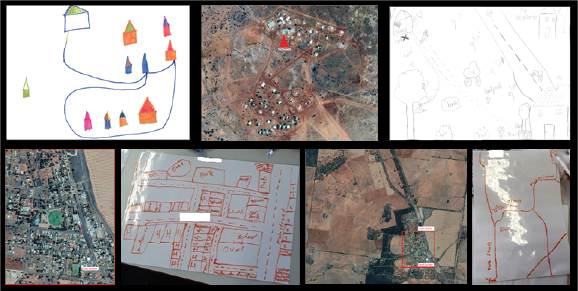
Equity and Spatial Reasoning: Reducing the mathematical achievement gap
Australian Research Council Discovery Grant
Tom Lowrie (Chief Investigator), Robyn Jorgensen (Chief Investigator)
in partnership with Professor David Uttal (Northwestern University/UC Adjunct Professor/Director of the Spatial Intelligence Learning Center).
Despite ongoing global efforts to reduce education gaps and recognition that differences in cultural and geographic backgrounds contribute to such gaps, little research has been conducted on how the development of students’ spatial knowledge is influenced by ethnographic factors. In this project we focussed our attentions on local communities, experiences and knowledge, and the impact this has on children’s representation of their known environment. We explored urban, regional, rural, and remote communities in Australia, a country that is culturally diverse and geographically sparse.
Project aims
- Investigate the role and nature of spatial reasoning in students’ development across a range of equity groups and vast geographic locations; and
- Substantiate the extent to which spatial skills developed in different contexts can be harnessed to support student learning.
Outcomes
Our results have shown the influence different geographic and cultural factors have on children’s maps of a familiar journey. Many developmental models do not account for the bottom-up nature of spatial development. This project has highlighted the rich spatial representations of students from diverse backgrounds who may not succeed in traditional spatial tests.
Much of the research into spatial reasoning examines lab-based or abstract notions of spatial reasoning and often this leaves students in regional, rural, and remote areas at a disadvantage. We have visited sites with different social, geographical and cultural contexts and chosen to examine the question of spatial representations with a different lens. Our results indicate that the freedom to roam and explore the local environment afforded by rural and regional living has provided students with an advantage in representing their familiar space. We suggest that this embodied, contextualised spatial knowledge is a strong foundation for building further spatial skills.
Some related publications
Harris, D., Logan, T., & Lowrie, T. (2022). Authentic perspective-taking: Looking beyond abstract spatial skills to the influence of culture and environment. Learning, Culture, and Social Interaction, 33.
Lowrie, T., Jorgensen, R., Logan, T., & Harris, D. (2022). Culture and geography: How do primary students map their local environment? The Australian Educational Researcher, 49, 261-284.
Harris, D., Logan, T., & Lowrie, T. (2021). Contextualising space: Using local knowledge to foster students’ Location and Transformation skills. In Y. H. Leong, B. Kaur, B. H. Choy, J. B. W. Yeo, & L. F. Wong (Eds.), Excellence in Mathematics Education: Foundations and Pathways (Proceedings of the 43rd annual conference of the Mathematics Education Research Group of Australasia) pp. 227-234. Singapore: MERGA.
Lowrie, T., & Jorgensen, R. (2018). Equity and spatial reasoning: Reducing the mathematics achievement gap in gender and social disadvantage. Mathematics Education Research Journal, 30(1). 65-75.
Jorgensen, R., & Lowrie, T. (2018). Speaking spatially: Implications for remote Indigenous learners. In Hunter, J., Perger, P., & Darragh, L. (Eds.). Making waves, opening spaces (Proceedings of the 41st annual conference of the Mathematics Education Research Group of Australasia) pp. 439-446. Auckland: MERGA.
